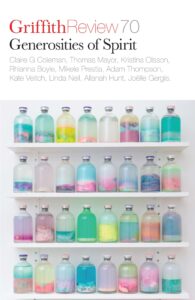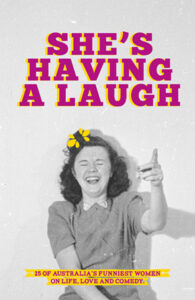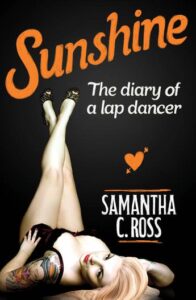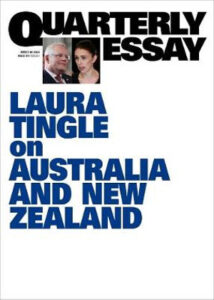And so we reach December 2020 in what has been a very strange year. December was relatively quiet for History, Memoir and Biography, with eleven reviews posted to the Challenge.
As always, some of these reviews picked up on books that have been featured in these Round Ups previously. Jackie read Jacinta Parson’s Unseen: The secret world of chronic illness (review here) and Mrs. B’s Book Reviews appraised Belinda Murrell and Kate Forsyth’s Searching for Charlotte (review here). Two reviews were posted for Betty O’Neill’s The Other Side of Absence, one by Mrs B. and a second by Alex Daw who reviewed the book from a Family History perspective.
Compilations
A number of literary journals present a combination of fiction, poetry and non-fiction – a mixture that does not fit neatly into our Australian Women Writers Challenge database! Cass Moriarty gave a brief review of Overland Literary Journal Issue 239 (Winter 2020) and a longer review of Griffith Review 70 Generosities of Spirit  (2020). She was particular taken by Kris Olsson’s extract from her work-in-progress titled ‘Invisible Histories: Excavating the Buried Past’. Cass writes:
(2020). She was particular taken by Kris Olsson’s extract from her work-in-progress titled ‘Invisible Histories: Excavating the Buried Past’. Cass writes:
Kris opens with encouraging us to imagine ourselves as birds, flying high above the earth and back through the millennia of time, as we visualise ancient Australia before it was even a continent. Combining geology and history with personal anecdotes, Kris writes so evocatively and poignantly about belonging and place, and about our complicated settler-colonial history. Along with snippets from her own family narrative, Kris is determined to ‘find my own root and branch, and who and what shaped the ground that held them, that grew me.’ It is a stunning piece. (Review here)
Another compilation volume was compiled by comedian George McEnroe She’s Having a Laugh: 25 of  Australia’s Funniest Women on Life, Love and Comedy (2015). There’s some names here you might not expect or recognize: as well as George McEnroe herself, there are essays by Yumi Stynes, Gretel Killeen, Jennifer Wong, Tracey Spicer, Candy Bowers, Annabel Crabb, Fiona Scott-Norman, Corinne Grant, Anita Heiss, Jodie Hill, Sarina Rowell and Caitlin Crowley. Emily – A Keyboard and an Open Mind reviewed the book:
Australia’s Funniest Women on Life, Love and Comedy (2015). There’s some names here you might not expect or recognize: as well as George McEnroe herself, there are essays by Yumi Stynes, Gretel Killeen, Jennifer Wong, Tracey Spicer, Candy Bowers, Annabel Crabb, Fiona Scott-Norman, Corinne Grant, Anita Heiss, Jodie Hill, Sarina Rowell and Caitlin Crowley. Emily – A Keyboard and an Open Mind reviewed the book:
I have to admit that given the title of this collection of essays, I was kind of expecting them to be, well, funnier. Maybe it’s just that my sense of humour didn’t gel with the majority of these 25 women. In many cases, though, I don’t think the authors were intentionally setting out to be funny, and maybe my expectations were at fault. (Review here).
Biographies
 Another compilation, but this time of biographical entries written by historian Carolyn Collins and journalist Roy Eccleston, can be found in Trailblazers: 100 Inspiring South Australian Women (2019). The volume features women across South Australia’s history from an array of fields, whose influences ranged from local communities to the international stage. The entries are ordered alphabetically, with an excellent bibliography. Sue at Whispering Gums writes:
Another compilation, but this time of biographical entries written by historian Carolyn Collins and journalist Roy Eccleston, can be found in Trailblazers: 100 Inspiring South Australian Women (2019). The volume features women across South Australia’s history from an array of fields, whose influences ranged from local communities to the international stage. The entries are ordered alphabetically, with an excellent bibliography. Sue at Whispering Gums writes:
There are so, so many stories here of women who have strived and achieved, often, of course, against immense odds. Because of its alphabetical arrangement, Trailblazers works more as a reference book, or one to dip into, rather than one telling “a story”, which it might have been under, say, a chronological arrangement or if ordered by spheres of activity or influence. The approach is, in a sense, encyclopaedic, providing brief biographies relevant to each woman’s reason for inclusion. This is not the place for whole-of-life, warts-and-all stories. Nor should it be, as that’s not its intention. (Review here)
If you have visited Darwin, you may be familiar with the Olive Pink Botanic Gardens. But who was Olive Pink? Julie Marcus answers in her The Indomitable Miss Pink: a life in Anthropology (2002 and 2005). As Janine at Resident Judge of Port Phillip notes, she is still spoken of today as:
…a tall, erect woman, dressed in white, with a long skirt and parasol. Neighbours and little children remembered her derelict hut with its idiosyncratic ‘museum’ and a straggly garden where she grew flowers for sale. Pastoralists saw her, and her activities, as a threat to their leases. Arrernte and Warlpiri had their own stories of Olive Pink from the time that she lived amongst them in the 1930s and 1940s, learning their language and customs. Bureaucrats and public officers had their own Olive Pink stories when they were on the receiving end of her remonstrations, delivered in person face-to-face or through long, underlined, parenthesized letters. …Marcus has to tread a narrow line with this book, and she does it well. She clearly admires the moral clarity of Olive Pink, even if she distances herself from the racialised language in which it is expressed. She is well aware of Pink’s prickliness, stubbornness and emotional stupidity, but there is a swell of respect for her grit and resilience – a much over-used word today, but completely appropriate for Olive Pink. (Review here)
Memoir
It’s hard to imagine more difference in two women than between Miss Pink and Samantha C. Ross, the lap  dancer who has recorded her memoirs in Sunshine: The Diary of a Lap dancer (2020). In her review, Shelleyrae@Book’dOut writes:
dancer who has recorded her memoirs in Sunshine: The Diary of a Lap dancer (2020). In her review, Shelleyrae@Book’dOut writes:
Spanning a period of about a year, Samantha C. Ross invites the reader to share her experiences as she gyrates, stumbles, and skips her way between ‘Gentleman’s’ clubs in several Australian states …I found the behind-the-scenes look at the profession to be interesting, from the various laws that govern the behaviour of both the women and their patrons, to the (high school-ish) hierarchy and unspoken rules that govern the change rooms and floor. In many ways a strip club is a workplace like any other, with its share of WorkSafe regulations, awful bosses and entitled customers, though few offices permit drinking champagne and spirits on the clock. (Review here)
History
Quarterly Essays generally address a current topic, but Laura Tingle’s Quarterly Essay 80 The High Road: What Australia Can Learn from New Zealand (2020) is a combination of history and politics. In her review,  Janine at Resident Judge of Port Phillip notes that Tingle’s essay:
Janine at Resident Judge of Port Phillip notes that Tingle’s essay:
breaks new ground by drawing our attention to something almost unremarkable: the similarities and divergences between Australia’s political scene and that of our neighbour, New Zealand. …there are a number of other areas where Australia and New Zealand have taken different approaches, forming a type of laboratory experiment where two very similar nations, acting under similar geographical and population constraints, have adopted different policies. …For me, the best Quarterly Essays are those that bring to the forefront something that is hiding in plain sight. I don’t think that I’ve read a historical or political comparison of Australia and New Zealand written in this way, and having read it, I don’t know why it hasn’t been done before. (Review here)
Farewell to 2020…
There was a slight decrease on the number of books reviewed in the History, Memoir and Biography category with 163 reviews of 112 books this year, compared with 173 reviews of 121 books during 2019.
The most reviewed books were:
6 REVIEWS
- Your Own Kind of Girl (2019) by Claire Bowditch (Memoir)
5 REVIEWS
- Searching for Charlotte (2020) by Kate Forsyth and Belinda Murrell (Biography/memoir)
- I Choose Elena (2020) by Lucia Osborne-Crowley (Memoir)
- There Was Still Love (2019) by Favel Parrett (Biography/Memoir)
- Truganini: Journey Through the Apocalypse (2020) by Cassandra Pybus (Biography/History)
4 REVIEWS
- The Killing Streets: Uncovering Australia’s First Serial Murderer (2020) by Tanya Bretheron (History)
- An Alice Girl (2020) by Tanya Heaslip (Memoir)
It’s notable that all of these books were published within the last two years, and that many of them combine elements of history, memoir and biography within the one text. It’s lovely to see all three elements – history, memoir and biography – represented.
OUR REVIEWERS
Our most prolific reviewers are also very active in the other genres as well. Jennifer Cameron-Smith reviewed 22 books in the History, Memoir and Biography category; Janine Rizzetti reviewed 19; Cass Moriarty reviewed 18; and Denise Newton reviewed 10 books during the year.
Many thanks to everyone who participated during 2020 – a year that gave many of us more time than we could ever have imagined to read, but for some of us less appetite to do so.
About: I’m Janine Rizzetti and I blog at the immodestly-named The Resident Judge of Port Phillip where I indulge my love of reading, podcasts, history and seeing films and exhibitions just before they close. I am a historian, interested in Australian and colonial history, officially retired but more occupied than I thought I would be with my local historical society, playing with grandchildren, learning Spanish and now playing ukulele!





Thanks Janine for another great year of HMB!
Loved the annual stats and congrats to the top reviewers 🙂